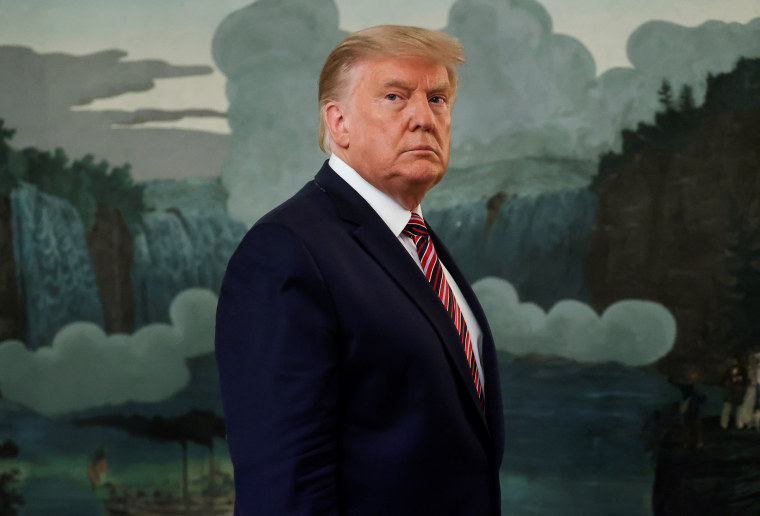President Donald Trump drew widespread criticism Wednesday after revelations surfaced that he had admitted six months ago to intentionally playing down the coronavirus threat. "I wanted to always play it down," Trump, who privately referred to the disease as "deadly," said in March.
But while Trump's remarks consumed Washington and the political media, another debate took place on social media that questioned the ethics of Bob Woodward, the journalist who taped the president's remarks six months ago and revealed them in his new book, "Rage," excerpts of which were released Wednesday.
"There is no ethical or moral defense of Woodward's decision to not publish these tapes as soon as they were made," John Stanton, the former Washington bureau chief for BuzzFeed, wrote in a tweet indicative of the blowback. "If there was any chance it could save a single life, he was obligated to do so. Bob Woodward put making money over his moral and professional duty."
Woodward, a veteran Washington Post journalist who became famous for his coverage of President Richard Nixon's Watergate scandal and has since written books about several presidents, conducted 18 interviews with Trump over six months.
On Feb. 7, Trump told Woodward that the coronavirus was "deadly ... more deadly than even your strenuous flu," Woodward wrote. Publicly, however, he played it down, said he wasn't worried about it and claimed that it would disappear.
Woodward wrote that when he interviewed Trump again on March 19, the president told him: "I wanted to always play it down. ... I still like playing it down, because I don't want to create a panic."
Nearly six months later, more than 6.3 million people in the U.S. have tested positive for the coronavirus, and about 190,000 have died.
Should Woodward have published the president's remarks earlier? Would more Americans have taken the coronavirus threat seriously had he done so? Would the president have taken the threat more seriously?
Those were the questions being posed, and, in many cases, answered, by Woodward's critics Wednesday.
"How differently might Trump's supporters have acted if — this whole time — they knew that he knew COVID was a serious threat?" tweeted Jessica Huseman, a reporter for ProPublica. "Woodward could have made that happen in February."
In a brief interview with The Associated Press, Woodward said he needed time to ensure that Trump's remarks were accurate. "He tells me this, and I'm thinking, 'Wow, that's interesting, but is it true?'" Woodward said. "Trump says things that don't check out, right?"
It's not clear which part of Trump's remarks about the deadliness of the coronavirus, or his desire to play it down, necessitated six months of fact-checking.
Woodward also told The Post that he didn't make any agreement with Trump to withhold his remarks until the book was published, which is often standard practice for journalists who are working on books and want their subjects to feel they can be more forthcoming than they might be for a news story that would be published the same day.
Download the NBC News app for breaking news and politics
Agreement or not, some critics said Woodward had a moral duty to immediately reveal what he knew: The president of the United States was willfully misleading the American public about a public health crisis.
"If journalism is a public trust — a trust that has consistently eroded — and Bob Woodward is an associate editor at @washingtonpost, why did Woodward sit on this information while Americans suffered and died?" tweeted Jose Antonio Vargas, a filmmaker and former reporter for The Post.
Some defended Woodward's work. David Maraniss, an investigative journalist and associate editor at The Post, tweeted that "the argument that lives might have been saved had [Woodward] reported this earlier is ahistorical." He also called the tapes of Trump's remarks "an invaluable public service."
Erik Wemple, a Post media critic, said the president might never have made these remarks to Woodward if he thought they would show up hours or days after he said them.
"The choice isn't between Woodward publishing this revelation in September and, say, March," he wrote on Twitter. "It's between Woodward publishing this in September or not at all."
A Twitter debate over ethics in journalism — even the ethics of one of the country's most famous journalists — is likely to peter out against the more pressing concerns about the president's own behavior.
Michael Socolow, a media historian and associate professor at the University of Maine, said in an email that Woodward has been using the same reportorial practices for over 40 years and that the ethics of his work "have been debated and discussed ad nauseum."
"The bigger issue," he said, "is that journalists hold incredibly damaging information all the time, for all kinds of reasons."
"To assume reporters always rush to publish all the valuable information they collect is to overlook a lot of the history of U.S. journalism," he said. "They might hold stuff for political reasons, or to enrich themselves, or for other reasons — and we can debate the ethics of that — but they withhold stuff. That's reality."
Even Trump weighed in on the topic. The president tweeted Thursday morning that Woodward did not immediately publish the quotes "because he knew they were good and proper answers."
"Calm, no panic!" Trump added.

